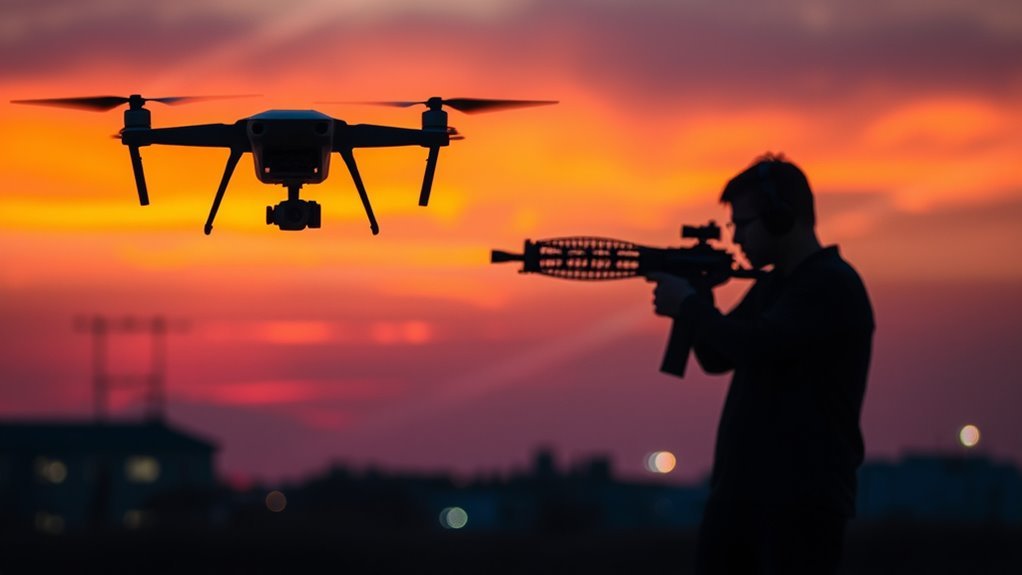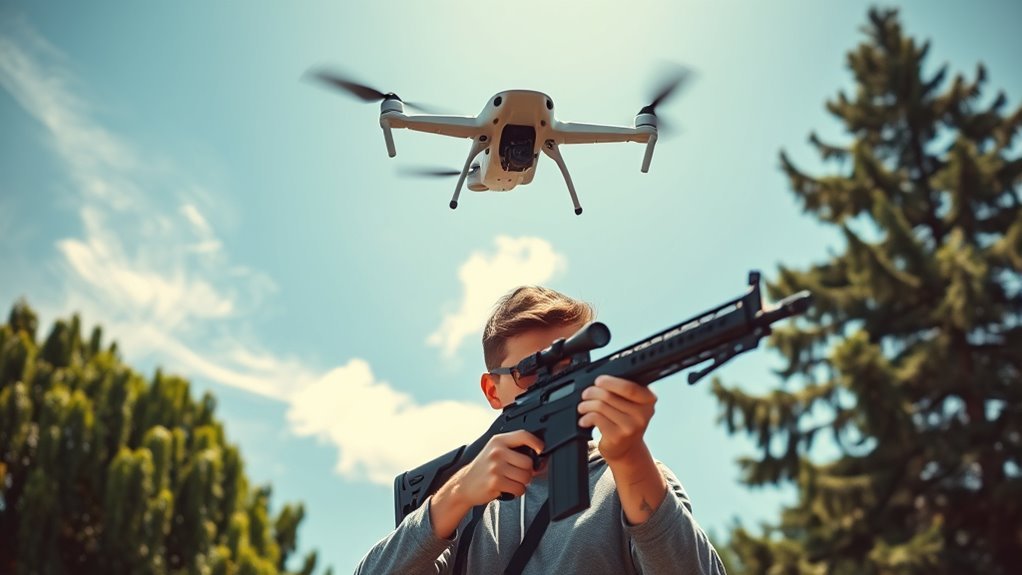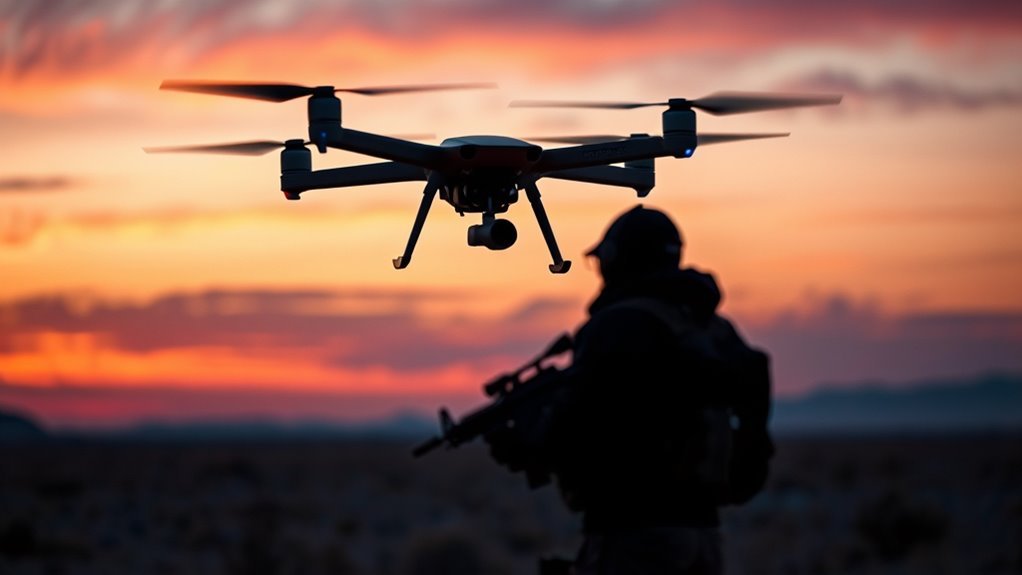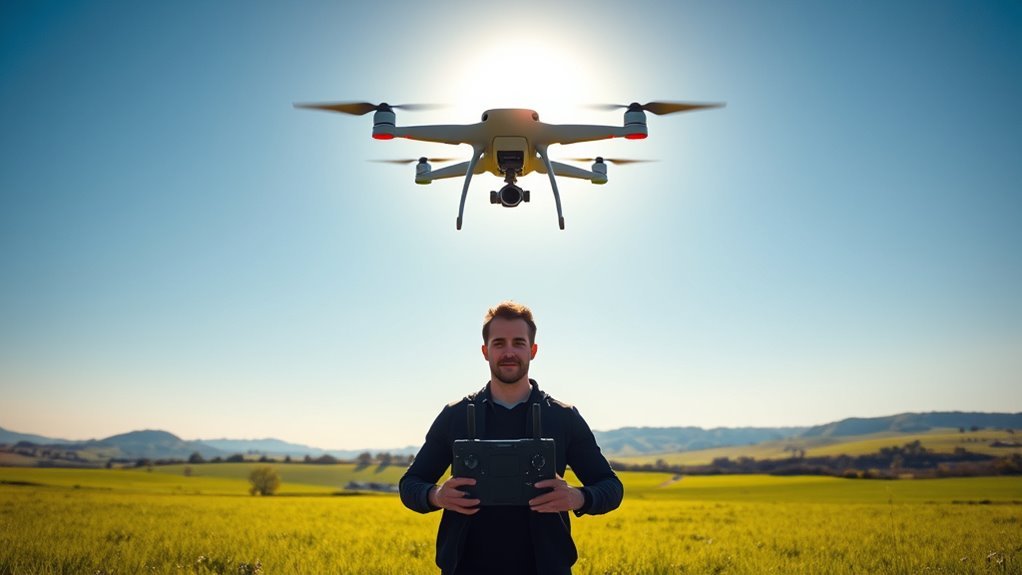Legally shooting down a drone is complex and fraught with potential legal repercussions. Federal and local regulations govern airspace and property rights, limiting your ability to act. You could face severe criminal charges or civil lawsuits from the drone’s owner. It’s essential to assess your rights as a property owner and understand the implications of your actions. If you’re concerned about unwanted drone activity, there are safer alternatives available that you might find intriguing.
Understanding Drone Regulations and Laws

When you consider taking action against a drone, it’s vital to understand the regulations and laws that govern their operation. Drones traverse through designated drone airspace, which is regulated by agencies like the FAA. If you’re thinking about taking action, you must be aware of the legal implications involved. Shooting down a drone can lead to severe criminal charges, including federal offenses, as it may violate airspace regulations. Additionally, the operator may have rights that protect their equipment. Understanding these laws is essential to guarantee you don’t inadvertently infringe on someone else’s rights or expose yourself to legal repercussions. Knowledge of drone regulations empowers you to make informed decisions while maneuvering the complexities of freedom and personal safety. Moreover, it’s important to recognize that drones classified as aircraft under federal law carry specific protections that further complicate the situation.
Assessing Your Rights as a Property Owner

As a property owner, it’s essential to understand the extent of your rights regarding aerial intrusions by drones. Property rights can vary greatly based on local regulations, which often dictate how you can respond to a drone on or over your land. By clarifying these legal boundaries, you can better assess your options and protect your privacy.
Property Rights Overview
Understanding your property rights is essential, especially when dealing with the increasing presence of drones. As a property owner, you have specific rights regarding your land ownership and the airspace above it. Generally, property boundaries extend vertically, meaning you may have some claim over the airspace directly above your property. However, the extent of these rights can vary by jurisdiction. It’s vital to know where your rights begin and end to avoid legal repercussions when considering any action against a drone. Always be mindful of local laws and regulations that might impact your ability to assert these rights. Protecting your space means understanding the legal landscape surrounding drones and how it intersects with your property boundaries.
Drone Regulations Explained
While maneuvering through the complexities of drone regulations, it’s crucial to recognize how these laws affect your rights as a property owner. Drone technology has advanced rapidly, enabling uses like aerial photography that can encroach on your privacy. The Federal Aviation Administration (FAA) typically governs airspace, but property owners can assert rights over their land. If a drone invades your airspace, you might have grounds to act. However, legal protections vary by state. Understanding your rights is important—some regions allow you to shoot down a drone if it poses a threat, while others may impose penalties. Always check local laws to verify your response aligns with regulations and protects your freedom without infringing on others’ rights.
Identifying the Reasons for Drone Interception

When considering intercepting a drone, you must first evaluate the reasons behind your decision. Common concerns include potential privacy invasions and threats to safety and security. Understanding these motives is essential for determining the appropriateness and legality of your response.
Privacy Invasion Concerns
As concerns about privacy invasion grow in our increasingly surveillance-driven society, the interception of drones has become a pressing issue. Many citizens feel their privacy rights are threatened by drone surveillance, which often operates without consent. These unmanned aerial vehicles can capture video and audio, intruding into private spaces and personal lives. This intrusion raises significant ethical questions about the balance between technological advancement and individual freedoms. You may find yourself questioning whether the benefits of drone technology outweigh the risks to your privacy. As the potential for abuse increases, so does the urgency to establish clear regulations that protect your rights while addressing the need for accountability in drone operations. Understanding these implications is crucial for advocating for your privacy.
Safety and Security Threats
Given the rise in drone usage, it is vital to recognize the potential safety and security threats they can pose. Drones equipped for surveillance can infringe on your privacy, capturing images and video without consent. This kind of drone surveillance can lead to feelings of vulnerability and anxiety, especially if you suspect they’re monitoring your property. Additionally, drones may serve malicious purposes, such as delivering contraband or conducting illegal activities. Property invasion by drones not only disrupts your sense of security but can also lead to serious legal implications. Understanding these threats is essential, as it empowers you to take appropriate action if a drone crosses the line, ensuring your rights and safety are maintained in an ever-evolving technological landscape.
Potential Legal Consequences of Shooting Down a Drone
Although you might feel justified in shooting down a drone that encroaches on your privacy or poses a threat, the potential legal consequences can be severe. Engaging in such an act may expose you to significant legal liability, including:
- Criminal Charges: You could face misdemeanor or felony charges depending on the circumstances.
- Civil Lawsuits: The drone’s owner may sue you for damages, claiming loss of property.
- Fines: Local or federal authorities may impose hefty fines for unlawful destruction of property.
- Reputation Damage: Involvement in a legal dispute can tarnish your public image.
Understanding these outcomes is essential before taking drastic measures against a drone, as the repercussions could outweigh the perceived infringement on your freedom.
Alternatives to Shooting Down a Drone
Instead of resorting to shooting down a drone, consider several safer and more legal alternatives to address the situation. You might explore drone deterrents, which can effectively minimize unwanted drone activity without causing harm. For instance, using signal jammers or net launchers can disable or capture drones safely. Additionally, employing reflective surfaces or visual deterrents can discourage drones from invading your airspace. It’s essential to assess the specific context of the drone’s presence—perhaps it’s merely conducting legitimate business. In such cases, engaging in communication or seeking alternative solutions, like contacting local authorities, can be effective. By prioritizing these legal methods, you can maintain your freedoms while respecting the laws governing drone usage. Furthermore, integrating multiple methods such as drone jamming enhances your ability to counter unwanted drone incursions.
Reporting Unlawful Drone Activity
If you’ve ruled out non-confrontational methods and suspect a drone is operating unlawfully, reporting the activity is a prudent course of action. To effectively engage in drone reporting, consider these steps:
- Document Evidence: Take photos or videos of the drone and its activity.
- Gather Details: Note the drone’s location, time of the incident, and any identifiable features.
- Identify Authorities: Determine the relevant local, state, or federal agencies responsible for drone oversight.
- Submit a Report: Provide your documentation and observations to the appropriate authorities, emphasizing the unlawful activity.
The Role of Law Enforcement in Drone Incidents
When drone incidents escalate or involve potential legal violations, law enforcement plays an essential role in addressing the situation. You need to understand that law enforcement protocols are designed to guarantee a systematic drone incident response. First, officers will assess the threat level, determining if the drone poses risks to public safety or privacy. They’ll gather evidence and may collaborate with local aviation authorities to identify the drone’s operator. In many cases, they’ll issue warnings or subpoenas before taking further action. Your awareness of these protocols can empower you to engage with law enforcement effectively, guaranteeing that your rights are respected while maintaining public order. Ultimately, law enforcement aims to balance individual freedoms with the community’s safety and security.
Future of Drone Legislation and Personal Privacy
As drone technology continues to evolve, the future of legislation surrounding its use will likely hinge on striking a delicate balance between technological advancement and personal privacy. To maintain this balance, consider these key factors influencing drone legislation:
- Data Collection: Regulations must address how drones gather and store personal information.
- Flight Zones: Defining no-fly zones around sensitive areas can protect privacy.
- Accountability: Establishing clear consequences for misuse can deter violations.
- Public Awareness: Educating citizens on their rights regarding drone surveillance is essential. Additionally, it is crucial to ensure compliance with national forest regulations to prevent misuse of drones in protected areas.
Frequently Asked Questions
Can I Shoot Down a Drone if It Invades My Personal Space?
You can’t just shoot down a drone invading your personal space. Drone privacy laws vary, and taking such action may lead to serious legal consequences. Always explore legal channels to address privacy violations instead.
What Types of Weapons Are Legal to Use Against Drones?
Imagine a knight defending his castle. For drones, non-lethal options like jamming devices or nets are often preferred. However, you must consider legal ramifications, as laws vary by region, potentially complicating your quest for freedom.
How Can I Identify the Drone’s Owner?
To identify a drone’s owner, check for drone registration information. You might also consider privacy laws, as they may dictate how and where you can obtain such details, ensuring you respect others’ rights while seeking answers.
Are There Specific Drone Safety Guidelines I Should Know?
Maneuvering the skies is like a dance; you need to know the steps. Familiarize yourself with drone regulations and safety measures to guarantee you fly responsibly, respecting others’ freedoms while enjoying the thrill of aerial exploration.
What Should I Do if I Accidentally Damage a Drone?
If you accidentally damage a drone, assess the situation. Review your insurance policy for potential claims and explore repair options. Document the damage, as this will aid in processing any claims or discussing repairs with the owner.

